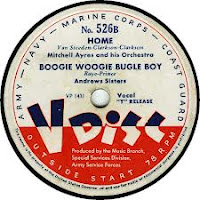Yesterday I had to travel to New Jersey on business. The weather was a near record breaking warm day, perfect for leisurely driving with the windows rolled down and the music turned up. An MP-3 player can have all your favorite tunes stored in it but there's no surprises -you know what you have. One of the appeals of radio is somebody else is in control of the playlist -with a good radio station there should plenty of surprises mixed in with the old favorites.
Years ago I lived in a quaint little bungalow overlooking the salt marshes to Atlantic City. At the time it was a spare and desolate visa with the broadcast tower of WOND in the middle of it. Because we were only a few hundred yards away from the tower, WOND was practically the only AM station we could get. The signal would even bleed through the stereo and you could hear a ghostly transmission in between the tracks of every record we played. My roommates and I would tell visitors that you could pick up WOND through the toaster and on rare occasions through your dental work -of course that wasn't true but was fun to see what people were willing to believe.
One Saturday afternoon WOND had a special program about the origins of Rock & Roll. Not real cutting edge today but it was the late 1970's. Popular music was in the lazy doldrums of complacency. The great Rock & Roll revival was over, Progressive Rock was already getting long in the tooth, Disco arrived with scorn and contempt, and Punk / New Wave was just beginning to percolate up from the underground. If anything Punk was a strong reaction to where music had gone wrong, it was a move to "do it yourself" reliance. It did not matter if you sing or play just get up on stage and do it -if you did it with enough feeling everything else will fall into place. People wondered if Rock & Roll had played itself out and had nothing new to say.
The myth was that Bill Halley and The Comets started it all with Rock Around The Clock. The radio DJ could not disagree more and played Saturday Night Fish Fry by Louis Jordan and the Tampany Five. It was a hit in 1949, three years before Bill Haley.
But this wasn't the only example of rhythm and blues breaking away from mainstream jazz and big band music to start out in a new direction. The DJ at WOND played one after another from his collection of "race records". These were songs that at that time could not be played on the radio and were usually sold clandestinely under the counter like pornography. It was like listening to Firesign Theater's record Everything You Know Is Wrong except Firesign Theater was satire and this was real .

So Rock & Roll wasn't invented by white people -unless of course you believe one of the gags from the movie Back To The Future where Micheal J Fox's character Marty McFly teaches Chuck Berry's cousin to rock out at the prom.
The DJ kept going back into time until he played a 1938 recording of Sister Rosette Tharpe. This was not another suggestive song about drinking, partying and sex... no this was gospel but not like traditional gospel. Sister Rosette Tharpe is banging out the tune on her electric guitar and it was a revelation.
This is just a small sample from Youtube -I'm not sure this is the song I heard on that long ago radio broadcast but it should give you a hint of Sister Rosette's talent. I did see on Youtube a copy of the BBC special titled "The Godmother of Rock and Roll".
You can look up more about Sister Rosetta on your own. One note of trivia I'd point out is Sister Rosetta was one of the very few African-American performers ever allowed to record on V-disc records during World War 2. The V-discs were produced by the US government for the entertainment of front line soldiers and sailors -the armed forces were still segregated until 1947.

I once had a chance to buy several V-disc 78 rpm records and I could kick myself for not doing it. After World War 2 the V-discs were collected up and destroyed by the government. A few servicemen were even arrested and imprisoned for trying smuggle them back to the United States.
Sister Rosette like so many other African American artists became more popular in Europe than her home country. By the end of the 1960's her career was fading and was no longer able to preform due to a stroke in 1970. She died in poverty in 1973 and was buried in Philadelphia. It wasn't until 2008, after a benefit concert, a stone was placed at her grave.



No comments:
Post a Comment